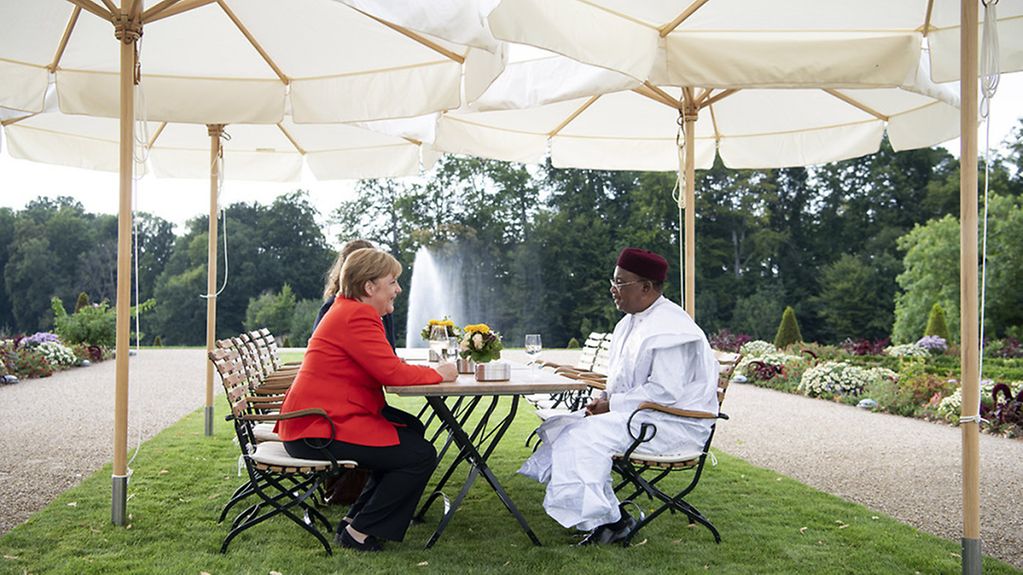Der Link wurde in Ihrer Zwischenablage gespeichert
Chancellor Angela Merkel has thanked the President of the Republic of the Niger, Issoufou Mahamadou, for the "extremely successful cooperation" in the fight against illegal migration. Germany, she said, will help create prospects in the region, in terms of education and positive economic development.
3 Min. Lesedauer

Chancellor Angela Merkel and President Issoufou Mahamadou reported that progress has been made on stemming illegal migration
Foto: Bundesregierung/Bergmann
The Niger is primarily affected as a transit country for illegal migrants. Over dinner at Schloss Meseberg, the German government guesthouse, Chancellor Angela Merkel and President Issoufou Mahamadou discussed bilateral relations, cooperation in the field of migration, and regional development and stability.
Angela Merkel stressed that the fight against illegal migration can only be won "if we give the people genuine prospects of economic development in their own countries and education for their children". Germany and the Niger have engaged in development cooperation since 1962. This has been stepped up significantly over the last few years, reported the Chancellor.
For the period from 2018 to 2020, Germany has pledged the Niger a total of 115.5 million euros. That is almost double the sum provided between 2014 and 2017. At the donor round table in Paris in December 2017 another 50 million euros were pledged.
The Niger is one of five priority African states within the framework of the EU’s compact on migration. Since the introduction of this framework for EU partnership in June 2016, significant progress has been made with the Niger on cooperation in the field of illegal migration.
Stricter border controls and measures against human trafficking have made it possible to clamp down on the traffickers. Parallel to this, the German government and the International Organization for Migration have managed to increase the number of migrants from the Niger returning voluntarily to their countries of origin, as well as informing people about the dangers inherent in illegal migration.
At Schloss Meseberg, President Issoufou Mahamadou underscored the fact that the flow of illegal migrants has been reduced by more than 90 per cent since 2016 – from around 100,000 per year to 10,000. Relations between Germany and the Niger are "excellent" he reported, particularly in the field of migration, but also in the development sector.
At their meeting, Chancellor Angela Merkel underlined the fact that the fight against terrorism is another major challenge for the country. "The Niger must not only fight terrorist forces from the direction of Mali; it also borders on the Lake Chad Region," she said.
Terrorist organisations like Boko Haram pose a threat to the internal security and stability of the country. Germany will support the Niger and the Sahel states in their efforts to obtain a "robust international mandate" for the fight against terrorism, declared Angela Merkel.
The priority areas of Germany’s development cooperation with the Niger remain decentralisation and good governance, and productive agriculture and food security. There are also projects in the health and primary education sectors and in the promotion of alternative earning opportunities in order to make people in the Agadez region less dependent on migration-related business. The security sector in the Niger is receiving support in the fields of logistics and engineering. The presence of German troops in the Niger is a new element in bilateral relations. German Bundeswehr troops are stationed in Niamey. They are supporting the UN’s MINUSMA mission in Mali.